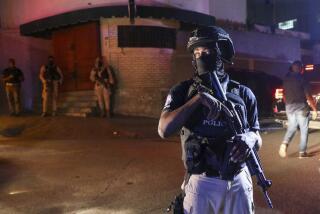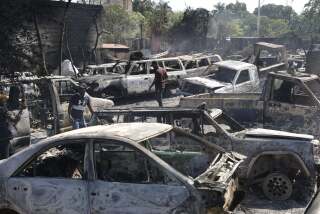7 Million New Refugees Reported in ’99
- Share via
WASHINGTON — Nearly 7 million people throughout the world were driven from their homes last year by war, civil insurgency or political repression, according to a report released Monday by a Washington-based advocacy group.
While victims of the conflicts in Kosovo, East Timor and Chechnya drew international attention, violence in Africa accounted for nearly half the worldwide total, the U.S. Committee for Refugees, or USCR, said in an annual report.
“We think there is a pattern in practice of treating African humanitarian emergencies as lower priority,” said Roger Winter, USCR executive director.
All told, last year’s conflicts increased the world’s uprooted population to 35 million, USCR said. That includes 14 million international refugees and 21 million people who are displaced within their own countries.
In Africa alone, 10.6 million people were counted as displaced within their countries at year’s end, and 3.1 million refugees had crossed into other nations.
Panos Moumtzis, U.S. spokesman for the Office of the United Nations High Commissioner for Refugees, said 1999 saw “the continuation of a trend of one conflict after another throughout the 1990s.”
USCR, a nonprofit organization that defends the rights of displaced people, estimated that of the 7 million, almost 2.5 million were able to return home. The net number of expatriate refugees increased by 600,000, while the net number of internally displaced people jumped by 4 million.
In Africa, violence drove an estimated 800,000 people from their homes in the Republic of Congo, 500,000 in Angola, 300,000 in Congo and 200,000 in Sierra Leone.
The crisis in Kosovo, by contrast, uprooted 1 million, while violence in East Timor displaced 750,000, and the fighting in Chechnya routed 500,000.
The United Nations will not release its own refugee data for 1999 until July, but Moumtzis said he agrees with Winter that the crisis in Kosovo received a disproportionate share of the world’s attention.
“It’s shocking to see the response being different from one end of the world to the other when the same human rights violations are occurring and similar numbers of people are involved,” Moumtzis said.
He cited Angola and Congo as examples of trouble spots that have received little notice despite the relatively large scale of conflicts there.
“We’re not asking anyone to downgrade the level of assistance to places like Kosovo,” Moumtzis said.
Bill Frelick, director of policy at USCR, suggested that the international community ought to adopt a new method of determining which regions receive humanitarian aid.
“At the end of the day, we ought to . . . weigh human need as closely as possible according to the conditions of the people concerned,” Frelick said. “Right now, there is a reluctance to commit financial power, as well as military power, into conflicts in Africa.”
Frelick and Winter said race appears to correlate with a reluctance to intervene in humanitarian emergencies, though both stopped short of identifying race as the reason for what they regard as the world’s turning a blind eye toward Africa.
More to Read
Sign up for Essential California
The most important California stories and recommendations in your inbox every morning.
You may occasionally receive promotional content from the Los Angeles Times.













